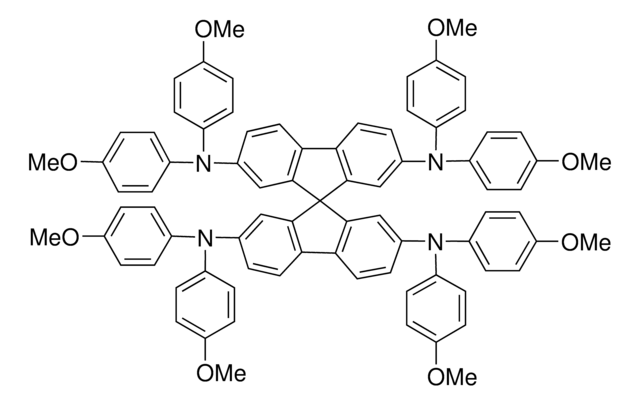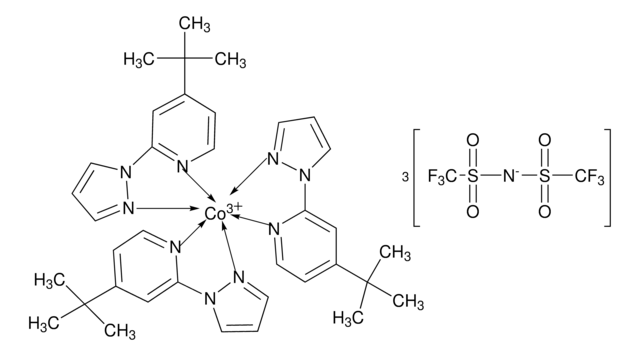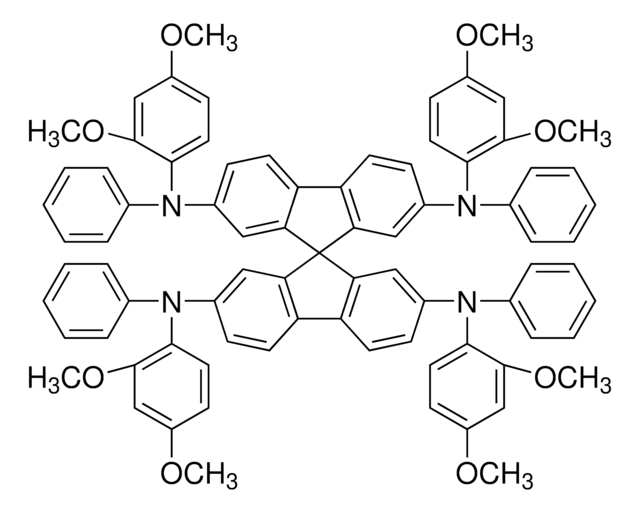916021
SHT-263S Solarpur®
Synonym(s):
N2,N2,N2′,N2′,N7,N7,N7′,N7′-octakis(4-methoxyphenyl)-9,9′-spirobi[9H-fluorene]-2,2′,7,7′-tetramine, Spiro-MeOTAD, Spiro-OMeTAD
About This Item
Recommended Products
assay
≥99%
Quality Level
form
powder
greener alternative product characteristics
Design for Energy Efficiency
Learn more about the Principles of Green Chemistry.
sustainability
Greener Alternative Product
impurities
≤0.5% Residual solvent
mp
247 °C
greener alternative category
InChI
1S/C81H68N4O8/c1-86-65-29-9-53(10-30-65)82(54-11-31-66(87-2)32-12-54)61-25-45-73-74-46-26-62(83(55-13-33-67(88-3)34-14-55)56-15-35-68(89-4)36-16-56)50-78(74)81(77(73)49-61)79-51-63(84(57-17-37-69(90-5)38-18-57)58-19-39-70(91-6)40-20-58)27-47-75(79)76-48-28-64(52-80(76)81)85(59-21-41-71(92-7)42-22-59)60-23-43-72(93-8)44-24-60/h9-52H,1-8H3
InChI key
XDXWNHPWWKGTKO-UHFFFAOYSA-N
General description
Application
- SHT-263S is a state-of-art, hole-transport material (Spiro-MeOTAD) for perovskite solar cells.
- SHT-263S offers high purity with modest cost.
- Together with the highest grade Spiro-MeOTAD, SHT-263 (902500) which has a purity of ≥99.9% (HPLC), these two trade-marked products provide high material purity, low-solvent residual, batch-to-batch consistency, and offer trusted high-performance in devices.
Legal Information
Storage Class
11 - Combustible Solids
wgk_germany
WGK 3
flash_point_f
Not applicable
flash_point_c
Not applicable
Choose from one of the most recent versions:
Certificates of Analysis (COA)
Don't see the Right Version?
If you require a particular version, you can look up a specific certificate by the Lot or Batch number.
Already Own This Product?
Find documentation for the products that you have recently purchased in the Document Library.
Articles
Novel biosensing devices, like bio-FET sensors, offer label-free analysis by detecting ionic and biomolecular charges, crucial for diagnostics and biological research.
Explore the eco-friendly potential of organic thin film transistors (OTFTs) for detecting chemical analytes, identifying viruses, and assisting in health diagnostics. This mini-review highlights challenges of achieving sustainability, safety, and biodegradability of each component of an OTFT sensor.
Our team of scientists has experience in all areas of research including Life Science, Material Science, Chemical Synthesis, Chromatography, Analytical and many others.
Contact Technical Service

![[6,6]-Phenyl C61 butyric acid methyl ester ≥99%](/deepweb/assets/sigmaaldrich/product/structures/359/221/d990c746-0960-4c69-bf76-fe09b193824d/640/d990c746-0960-4c69-bf76-fe09b193824d.png)





